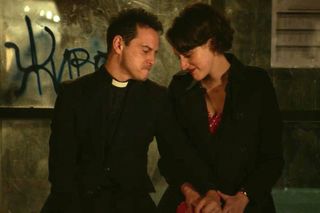
An Ode to Harmless Romantic Banter in a ‘Negging’ Era
A case for the dying fantasy of falling in love via sharp-witted come-backs in the era of pick up artists and unoriginal, boring negging.

Higher Than Heaven: A Biography Of Kurt Cobain has a re-telling of the first time the Nirvana frontman met Hole frontwoman and eventual wife Courtney Love, which goes like this —
“Love was holding court in a booth when she saw Kurt walk by a few minutes before his band was set to appear on stage. Courtney was wearing a red polka-dot dress. ‘You look like Dave Pirner [lead singer of Soul Asylum],’ she said to him, meaning the remark to sound like a small insult, but also a flirt … Cobain responded with a flirt of his own: He grabbed Love and wrestled her to the ground … She was glad her comment had gotten attention, but she hadn’t expected to be pinned to the floor by this little waif of a boy. For his part, Cobain hadn’t counted on his opponent being so tough: She was three inches taller than he was and stronger … But the roll on the floor was all in jest, and he pulled her up with his arms and gave her a peace offering — a sticker of Chim Chim, the ‘Speed Racer’ monkey he had made his mascot.”
Love’s then quick-tongued tease is now commonly known as a ‘neg’ or ‘negging,’ which means using a backhanded compliment to make another person seek your approval. Born out of internet chatrooms and made famous by Neil Strauss’ pick-up bible The Game, modern-day dating terms negging as using deliberate, pre-mediated backhanded compliments to ruin someone’s self-esteem and make them increasingly reliant on hard-to-get approval. Multiple dating gurus or pick-up artists — mainly male — exalt the effectiveness of breaking down a person’s self-esteem so their targets can become easier to bed. Common negs include “You’re funny for a girl,” or “You’d look so much better with make-up on” — both gross and culturally parasitic, with the trend refusing to die downover time.
Related on The Swaddle:
Of Ghosts and Draculas: Modern Dating Trends, Explained
What is fascinating is how a flirtatious banter can exist in a neutral space, charm everyone and hurt not one person — yet a culture of men who hate women on the Internet, i.e. pick-up artists, incels (involuntary celibates) and RedPilled (a male subculture focused on self-improvement and misogyny) individuals and more decided that vicious ‘negs’ or takedowns would let them soullessly add more numbers to their metaphorical sex scorecard. ‘Negging’ has existed since time immemorial — although in markedly less toxic ways — say, young children, pushing each other off swings in a park playfully in order to signify attraction. But, the sheer viciousness with which it manifests now, rather than the way it’s supposed to manifest — low-effort insults targeted at one’s self-esteem rather than graduating into fun, playful banter — is a reminder that dating culture is in desperate need of a complete overhaul.
There’s overwhelming, beloved artistic documentation of flirtatious banter — from Rosalind and Ganymede in As You Like It, to Fleabag and the Priest in Fleabag, to Elizabeth and Mr. Darcy in Pride and Prejudice, to Shruti and Bittoo in Band Baaja Baarat. The difference between flirtatious banter and negging is how much women enjoy the former and how much they manage to hold their own in these conversations. Fleabag can hold her own against The Priest because their banter is amidst equals — when he says “fuck you, then” while she walks away rudely, it’s electric because she turns around and smiles back at him. But, Anjali from Bollywood favorite Kuch Kuch Hota Hai laughing when Rahul negs her with an “Are you sick?” to tell her she’s beautiful— that’s not an exchange of equals, because Anjali is written as merely a receptacle for Rahul’s emotions, which is exactly what pick-up artist negging wishes to accomplish.
What women have always enjoyed is playful verbal sparring, which builds adrenaline and tension organically enough to graduate to potential ‘somethings.’ Take, for example, this quote from Pride and Prejudice —
Elizabeth Bennet: “I wonder who first discovered the power of poetry in driving away love.”
Mr. Darcy: “I thought poetry was the food of love.”
Elizabeth Bennet: “Of a fine, stout love it may. But if it is only a vague inclination I’m convinced one poor sonnet would kill it stone dead.”
Mr. Darcy: “So what do you recommend, to encourage affection?”
Elizabeth Bennet: “Dancing. Even if one’s partner is barely tolerable.”
or, Fleabag —
Fleabag: “Let’s just leave that out there just for a second on its own: I love you.”
The Priest: “It’ll pass.”
Yet, what women do get, is fringe-hatred moments that believe teasing and banter should equal infantilization. “Make your teases patently-absurd accusations that disqualify her from ever being your lover or girlfriend. You initialize the game (fun), you set the frame with her as the pursuer (you are judge and prize), you create a push-pull dynamic to keep her reeling and feeling (drama), you keep the subject on sex (as a preamble to later events in the evening, provided she impresses you), and you make your intentions clear as day (no creep, all stud),” reads one r/RedPill negging advice post.
‘The clearest difference between banter and negging is how it affects the other person. Teasing can make the other person feel good, whereas negging focuses on undermining their confidence,” Claudia Cox, a relationship coach, told Elite Daily. The easiest way to avoid negging is to be around those who value us, according to Clarissa Silva, the behavioral scientist. Silva also told Elite Daily that looking at dating like a social experiment is also useful, with respect to identifying and avoiding repeated negging attempts. She said, “Treat dating like you are collecting data on what you want and don’t want. … See what combinations of qualities and characteristics better complement you.”
Anyway, here’s to a good ‘neg,’ or flirtatious banter, the unsung hero of all good romantic comedy tension and what could’ve been a better dating scene, if scorecard toting pick-up artists had just sat down to study Elizabeth Bennet in Pride and Prejudice (2005) instead.
Aditi Murti is a culture writer at The Swaddle. Previously, she worked as a freelance journalist focused on gender and cities. Find her on social media @aditimurti.
Related


The Tech Industry’s Sexism, Racism Is Making Artificial Intelligence Less Intelligent
